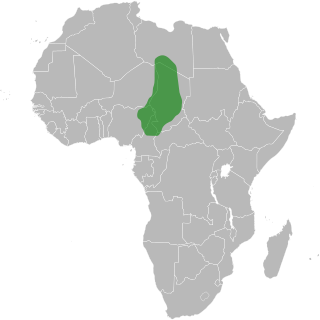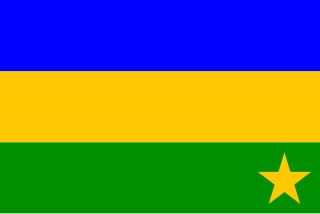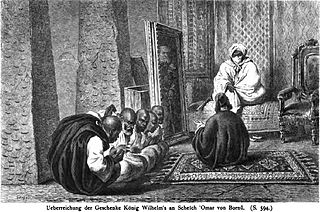| Ibrahim or Ibrahim Kura | |
|---|---|
| Reign | November 1884 to February or March 1885 - October 1885 to February 1886 [1] |
| Predecessor | Bukar Kura |
| Successor | Ashimi of Borno |
| Born | 1840s |
| Died | October 1885 to February 1886 Borno |
| Burial | |
| Dynasty | Kanemi |
| Father | Umar I ibn Muhammad al-Amin |
| Religion | Muslim |
Ibrahim or Ibrahim bin Umar al-Kanemi (1840s-c. 1885) was Shehu of Borno from c. 1884 to c. 1885.
Ibrahim became Shehu of Borno in 1884 at the death of his brother Bukar Kura. His uncle, Abba Masta Kura had been recognised Shehu before him but Ibrahim succeeded to bribe his way to the throne. His one-year reign was marked by an intense political crisis in Kukawa. [2] [3]

The Kanem–Bornu Empire existed in areas which are now part of Nigeria, Niger, Cameroon, Libya and Chad. It was known to the Arabian geographers as the Kanem Empire from the 8th century AD onward and lasted as the independent kingdom of Bornu until 1900.

The Kanuri people are an African ethnic group living largely in the lands of the former Kanem and Bornu Empires in Niger, Nigeria, Sudan, Libya and Cameroon. Those generally termed Kanuri include several subgroups and dialect groups, some of whom identify as distinct from the Kanuri. Most trace their origins to ruling lineages of the medieval Kanem-Bornu Empire, and its client states or provinces. In contrast to the neighboring Toubou or Zaghawa pastoralists, Kanuri groups have traditionally been sedentary, engaging in farming, fishing the Chad Basin, trade, and salt processing.
Ngazargamu, Birni Ngazargamu, Birnin Gazargamu, Gazargamo or N'gazargamu, was the capital of the Bornu Empire from ca. 1460 to 1809. Situated 150 km (93 mi) west of Lake Chad in the Yobe State of modern Nigeria, the remains of the former capital city are still visible. The surrounding wall is 6.6 km (4.1 mi) long and in parts it is still up to 5 m (16 ft) high.

Kukawa is a town and Local Government Area in the northeastern Nigerian state of Borno, close to Lake Chad.

Sayfawa dynasty, Sefouwa, Sefawa, or Sefuwa dynasty is the name of the Muslim kings of the Kanem–Bornu Empire, centered first in Kanem in western Chad, and then, after 1380, in Borno.
Hummay was the first Muslim king, mai, of the Sefuwa dynasty within Kanem-Bornu Empire from 1085 to 1097, replacing the Sefuwa-Duguwa dynasty.
Idris Alooma, Idris ibn 'Ali (Alooma), or Idriss Alaoma, (r. 1570–1602/03 or 1580–1617) was Mai (king) of the Kanem-Bornu Empire, located mainly in Chad, Cameroon, Niger and Nigeria. His name is more properly written Idris Alawma or Idris Alauma. An outstanding statesman, under his rule Kanem-Bornu touched the zenith of its power. Idris is remembered for his military skills, administrative reforms and Islamic piety. His feats are mainly known through his chronicler Ahmad bin Fartuwa.

Rabih az-Zubayr ibn Fadl Allah or Rabih Fadlallah, usually known as Rabah in French, was a Sudanese warlord and slave trader who established a powerful empire east of Lake Chad, in today's Chad.

Umar I ibn Muhammad al-Amin or Umar of Borno was Shehu (Sheik) of the Kanem-Bornu Empire and son of Muhammad al-Amin al-Kanemi.
The Girgam is the royal chronicle of the Kanem–Bornu Empire, written in Arabic. Girgam is also used as the name for written historical records in some kingdoms west of Bornu, including Daura, Fika and Mandara, defined as "chronicle or 'list of ancestors'" or simply "date".
Dunama Lefiami was the Mai (sultan) of the Kanem-Bornu Empire, located in what is now Nigeria, Cameroon and Chad during the early nineteenth century.

Shehu al-Hajj Muhammad al-Amîn ibn Muhammad al-Kânemî (1776–1837) was an Islamic scholar, teacher, religious and political leader who advised and eventually supplanted the Sayfawa dynasty of the Kanem-Bornu Empire. In 1846, Al-Kanemi's son Umar I ibn Muhammad al-Amin became the sole ruler of Borno, an event which marked the end of the Sayfawa dynasty's eight hundred year rule. The current Shehu of Bornu, a traditional ruler whose seat remains in modern Borno State, Nigeria, is descended from Al-Kanemi.
The Borno Emirate, or Borno Sultanate, is a traditional Nigerian state that was formed at the start of the 20th century. It is headed by the descendants of the rulers of the Bornu Empire, founded before 1000. The rulers have the title Shehu of Borno. The traditional emirate of Borno maintains a ceremonial rule of the Kanuri people, based in Maiduguri, Borno State, Nigeria, but acknowledged by the 4 million Kanuri in neighbouring countries.

Abu Bakr bin Ibrahim al-Kanemi was the Shehu of Bornu from 1902 to 1922.
'Abd ar-Rahman, Abdurrahman or Darman was Shehu of Borno from 1853 to 1854.
Bukar or Bukar Kura bin Umar al-Kanemi was Shehu of Borno from 1881 to c. 1884.
Ashimi or Hashim bin Umar al-Kanemi (1840s-1893) was Shehu of Borno from ca.1885 to 1893.
Kyari or Khair bin Bukhar al-Kanemi (?-1894) was Shehu of Borno in 1893-1894.

Shehu Umar Sanda ibn Ibrahim Kura al-Kanemi was the Shehu of Borno from 1922 to 1937. He was the son of Shehu Ibrahim Kura of Borno and brother of Shehu Abubakar Garbai.
Sanda Wuduroma, or Abu Sanda bin Buqar al-Kanemi, (?-1894) was Shehu of Borno in 1894.